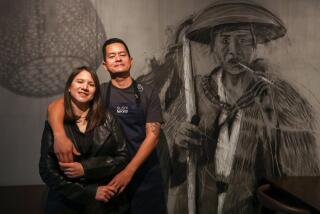U.S. Beef Still a Tough Sell in Wary Japan
- Share via
TOKYO — It’s been weeks since Japan ditched its import ban on U.S. beef and the first shipment went on sale, but American beef is nowhere to be seen at supermarkets here -- except this nation’s five Costco stores.
Many Japanese are worried about the safety of U.S. beef, and retailers here say they aren’t about to waste their time carrying an unpopular product. Instead, meat-section shelves are filled with domestic beef and cuts from Australia.
Japan was once the top destination for U.S. beef, importing $1.4 billion worth a year. But that was before Tokyo’s decision in December 2003 to ban American beef imports after the first reported case of mad cow disease in the U.S.
The U.S. government repeatedly has said the beef is safe because of stringent checks. But such assurances have done little to allay Japanese consumers’ fears about mad cow disease, or bovine spongiform encephalopathy, a nerve disease in cattle.
Eating contaminated meat products has been linked to the rare but fatal human variant Creutzfeldt-Jakob disease in more than 150 deaths. The outbreak, mostly in Britain, peaked in the 1990s.
“It’s scary, all this talk about mad cow disease,” said homemaker Kimie Suzuki, who eats mostly fish but sticks with Japanese beef when she eats red meat. “I’ve had foreign beef before, but it tastes different.”
Fears of Japanese like Suzuki have grown, not diminished, in recent months.
The ban on American beef was eased in December 2005 but imposed again in January after prohibited spinal bones were found in a veal shipment -- an error by U.S. plant workers and a government inspector who didn’t realize that veal cuts with backbone, allowed in the U.S., were considered a risk for mad cow disease in Japan.
That error was crucial, making consumers even more suspicious of U.S. meat.
Kaori Watanabe, spokeswoman for Aeon Co., said the nation’s top supermarket chain hadn’t received a single call from customers asking for American beef. Aeon, which operates more than 300 food stores nationwide, often is deluged with requests for products, so that means there’s no interest in American beef, she said.
“We decided against it until there’s a situation in which customers can buy it without worrying about it,” Watanabe said.
Ichiro Tanaka, spokesman for major supermarket chain Ito-Yokado Co., says he’s been happy selling Australian and Japanese beef since his stores, numbering about 180, stopped carrying American beef three years ago.
“American beef hasn’t won the understanding of Japanese consumers,” he said. “Consumers don’t trust it.”
Even Seiyu Ltd., the Japan unit of U.S. retail giant Wal-Mart Stores Inc., which runs more than 200 stores nationwide, isn’t selling American beef.
A survey by Tokyo-based marketing researcher Intage Inc. earlier this month found that 54% of the respondents said they wouldn’t buy American beef. In a similar survey in December 2005, 45.4% of respondents said they wouldn’t buy U.S. beef.
Japanese tend to be suspicious of their government, which some think caved in to political pressures from Washington, Japan’s No. 1 ally, to let in a possibly tainted product.
American beef at about $11.70 a pound is a fraction of the cost of Japanese beef, which can cost 10 times as much.
Australian beef competes well against American beef at about the same prices. The Australian cattle industry has jumped into the opportunity presented by the stumbling of U.S. beef exporters.
The industry is aggressively promoting the safety of Australian beef, noting that Australia has never had a case of mad cow.
Costco Wholesale Japan Inc., a unit of U.S. warehouse retailer Costco Wholesale Corp., is one exception in pushing American beef.
But Costco appeals to the well-traveled Japanese who buy in bulk -- a minority in an island nation more accustomed to small homes and frequent shopping. Still, Costco’s entire 5.1-ton first shipment of U.S. beef sold out within about 24 hours. Another batch went on sale a week later and is selling well, according to Costco.
“The response and demand for U.S. beef has been overwhelmingly strong,” Costco Wholesale Vice President Mike Sinegal said.
The other high-profile purveyor of U.S. beef is fast-food chain Yoshinoya D&C; Co., which made its fortune on the beef bowl, a serving of hot rice topped with slices of American beef.
When the chain announced it would serve its final beef bowl in 2004 because of the import ban, crowds rushed to its outlets to devour American beef.
But Yoshinoya has not yet started selling beef bowls again, promising the dish sometime next month.
More to Read
Sign up for Essential California
The most important California stories and recommendations in your inbox every morning.
You may occasionally receive promotional content from the Los Angeles Times.













